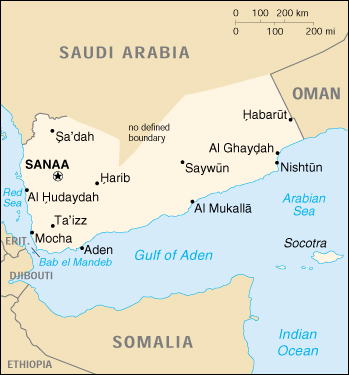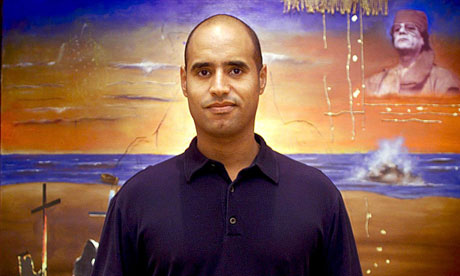http://news.antiwar.com/2012/04/07/in-yemen-saleh-loyalists-attack-blockade-airport/
 Armed tribesmen and troops in uniform opened fire with heavy weapons, destroying a tower before they surrounded and blockaded the airport in the capital Sanaa, officials said.
Armed tribesmen and troops in uniform opened fire with heavy weapons, destroying a tower before they surrounded and blockaded the airport in the capital Sanaa, officials said.

In Yemen, Saleh Loyalists Attack, Blockade Airport
The infighting among Yemen's ruling factions exposes a rift between the old order and the new
by John Glaser, April 07, 2012
Yemeni authorities shut down the airport in Sanaa after militants loyal to Yemen’s ousted president attacked it with anti-aircraft guns on Saturday, revealing a possible rift within the country’s ruling factions.
 Armed tribesmen and troops in uniform opened fire with heavy weapons, destroying a tower before they surrounded and blockaded the airport in the capital Sanaa, officials said.
Armed tribesmen and troops in uniform opened fire with heavy weapons, destroying a tower before they surrounded and blockaded the airport in the capital Sanaa, officials said.“The attack comes a day after Yemen’s new President Abed Rabbo Mansour Hadi fired key security officials appointed by ex-president Ali Abdullah Saleh,” reports the Washington Post, “including his half brother, the air force commander Mohammed Saleh al-Ahmar, and his nephew, Tariq, who headed the presidential guard.”
With some pressure from his American backers, Hadi has promised to purge Saleh loyalists from his government. Hadi came to power after the Obama administration helped broker a political transition which gave Saleh immunity for crimes he committed while in office (and on the U.S. payroll). Some argue this immunity has allowed Saleh to continue exercising power behind the scenes.
Indeed, Yemeni Defense Minister Mohammed Nasser Ahmed told parliament on Thursday that “Saleh is still giving orders to governors and security officials using headquarters of his son, Ahmed — the commander of the powerful Republican Guards— as his operation room,” reports the Post. Saleh’s aim could be to stoke instability in order to regain power.
Meanwhile, U.S. involvement in Yemen is contributing to the country’s instability. Support for the Hadi regime and an ongoing drone war is militarizing the conflict-ridden country and creating a greater security risk to Yemenis as well as American interests.
and......
http://original.antiwar.com/updates/2012/04/07/18-killed-in-iraq-as-kurds-question-baghdads-motives-in-hashemi-escape-to-kurdistan/
18 Killed in Iraq As Kurds Question Baghdad’s Motives in Hashemi Escape to Kurdistan
Saturday: 18 Iraqis Killed, 14 Wounded
by Margaret Griffis, April 07, 2012
The Kurdish Blocs Coalition demanded to know why Vice President Tareq al-Hashemi was allowed to travel from Baghdad to Kurdistan even though an arrest warrant had already been issued. They claim to have proof of the allegation and even the name of the judiciary member who issued the warrant. In original news reports, the vice president had been briefly detained at the Baghdad airport, giving some credence to the new claim. They did not reveal any guesses as to why Baghdad would have wanted Hashemi to escape the warrant. Hashemi is accused, by his political rival Prime Minister Nouri al-Maliki, of having ties to terrorism.
At least 18 Iraqis were killed and 14 more were wounded.
In Baghdad, a bombing on a minibus in the Karrada district left as many as three dead and eight wounded.
A roadside bomb killed three policemen while they patrolled Khan Bani Saad.
Two policemen were killed and two more were wounded when mortars struckHammam al-Alil.
In Mosul, gunmen killed a real estate agent, the second agent this month. Two soldiers were injured in an I.E.D. explosion.
Gunmen killed a civilian has he drove in his car in Shirqat.
A man and his four-year-old daughter were injured in Kirkuk, when an I.E.D. exploded outside their home. A civilian was kidnapped.
The body of a young man was found floating in the Euphrates River in Qasim. The cause of death is being determined.
A policeman was killed during clashes in Qayara.
An explosion took place on a pipeline in the Idil area.
A bomb blew up in front of a judge’s home in Diwaniya, but no casualties were reported.
and....
http://www.guardian.co.uk/world/2012/apr/07/libya-saif-gaddafi-war-crimes-hague
Libya to defy UN on handing over Saif Gaddafi, documents reveal
Tripoli blocking efforts of war crimes tribunal to try late dictator's son in the Hague, say lawyers

Saif al-Islam Gaddafi could be tried and executed in Libya if the ICC's efforts continue to be resisted. Photograph: Rex Features
Libya is set to defy the United Nations by holding its own trial of Saif al-Islam Gaddafi, son of the country's deposed dictator, without handing him over to the international criminal court, newly released documents show.
Reports by ICC lawyers accuse Libya of orchestrating a programme of obstruction in efforts to bring him to justice in the Hague.
Libya is obliged under UN rules to hand over Saif – who had been tipped to succeed Muammar Gaddafi – to the ICC, where he is indicted for crimes against humanity. However, the Libyan government is determined to hold its own trial and is expected to move Gaddafi to a specially built fortress-prison in Tripoli this week.
Gaddafi, 39, was charged by the ICC last year with helping to mastermind the former regime's murderous campaign of torture, murder, rape and bombardment of Libyan rebels.
He was captured by militia units in November while trying to flee through the Sahara desert, and has remained incarcerated in the mountain town of Zintan. But instead of handing Gaddafi over to the ICC, as mandated by the UN security council, Libya insists that the trial must be on its home soil.
Court documents show that ICC defence lawyers have been complaining that they have faced resistance and obfuscation from the Libyan authorities. "The prosecuting authorities appear to have manipulated the status of domestic investigations in order to meet the political and strategic imperative that Mr Gaddafi should not be transferred to the ICC," writes Xavier-Jean Keita, principal counsel for the Hague's defence office.
Keita records that during the single visit Tripoli had allowed him to make to Gaddafi, officials told him the suspect was not being held for international crimes but for his "alleged failure to have licences for two camels, and cleaning of fish farms".
When the ICC insisted that Libya make a formal request to hold the trial of Gaddafi on home soil, Tripoli agreed to begin the process on 30 April, but Libya's leader, Mustafa Abdul Jalil, has separately announced that Gaddafi's trial will begin by 13 April.
"It is clear that the ICC will not be in a position to render its decision on the admissibility of the case until after Mr Gaddafi has been tried, and potentially sentenced and executed," writes Keita in documents filed with the court. "The postponement of Mr Gaddafi's surrender could therefore be at the cost of his life."
The refusal to co-operate with the court raises questions about the new regime's commitment to the rule of law. Human rights groups have already accused Libya of refusing to take action against militias accused of torturing suspects in detention centres.
Concern has also been raised in Britain, Canada and Australia over the failure of the authorities to arrest militia men who were filmed desecrating Commonwealth war graves in the eastern town of Benghazi last month. International non-governmental organisations say the decision of Libya's new rulers to defy the UN is a high-stakes gamble for a government still heavily dependent on international goodwill. "The framework here was set up by the security council by unanimous adoption," said Richard Dicker, head of international justice at Human Rights Watch in New York. "It would be a severe loss of credibility for the new Libyan government for them to put themselves in breach of a security council resolution."
A similar refusal to hand over ICC suspects by Sudan triggered sanctions against Khartoum.
Libya has yet to inaugurate a functioning courts system and has not made public the charges Gaddafi will face. Nor has it granted him access to a lawyer, family visits or even, court documents show, a dentist to deal with chronic toothache.
Last month the Observer was granted exclusive access to the elaborate jail constructed within the confines of an existing prison to hold Gaddafi on the outskirts of Tripoli.
Facilities include a private basketball court, chef and round-the-clock medical cover. Gaddafi is expected to be housed there for a trial that the government has promised must end before parliamentary elections in June.
"The justice system in Libya continues to be virtually paralysed," said Amnesty International's Marek Marczynski. "If you read the [ICC] documents it's quite clear that the Libyan authorities haven't been doing any legal work that would allow them to put this case on hold."
Libya says it has the right to try war crimes suspects at home. Justice minister Ali Khalifa Ashur insisted publicly that the ICC had agreed that Libya could hold its own trial – something the court denies.
Last week the Hague's patience appeared to snap, with the judges telling Libya that no more appeals would be granted and giving the equivalent of a "final warning" to hand Gaddafi over. Libya's determination to hold the trial is motivated in part by the desire of ordinary Libyans to see the man who caused them such suffering, both during and before last year's revolution, brought to account by those he terrorised.
Some officials with ties to the former regime may also be uncomfortable knowing that Gaddafi would get a public stage if he were sent to the Hague. And it is not only officials in Libya: if Gaddafi makes it to the ICC, other investigators will be lining up to interview him.
British and US investigators are anxious to know details of the deal Saif Gaddafi brokered that saw convicted Lockerbie bomber Abdelbaset al-Megrahi freed in 2009 and whether it was linked to oil contracts for BP.
Gaddafi will also be sought by French officials probing media allegations that he arranged for Libyan funds to be channelled to the election campaign of president Nicolas Sarkozy in 2007.
The London-educated former playboy will be able to give his side to the scandal which engulfed the London School of Economics when it emerged he had pledged £1.5m after it awarded him a controversial doctorate.
Tidak ada komentar:
Posting Komentar